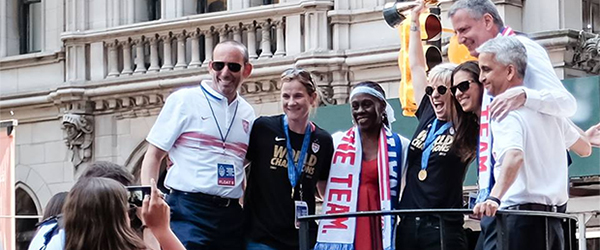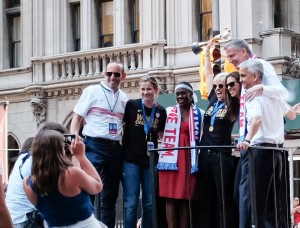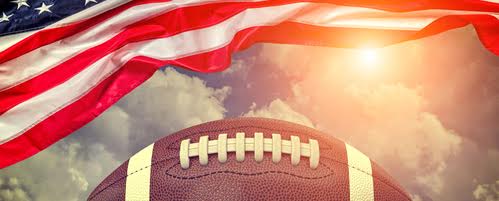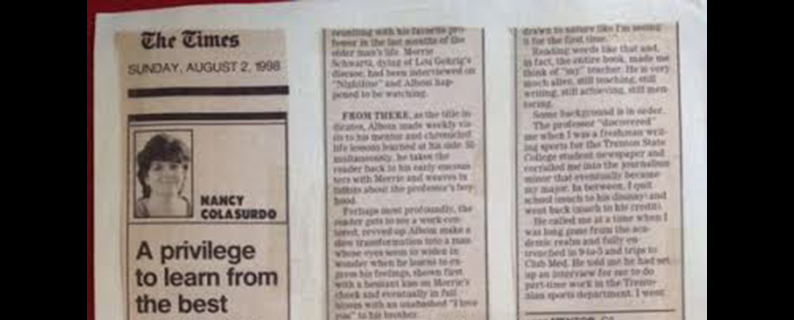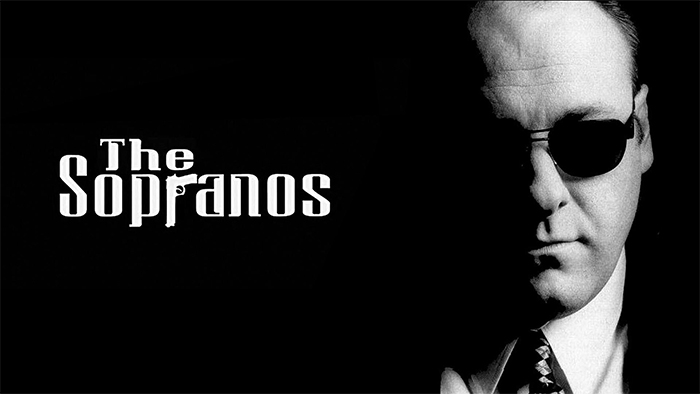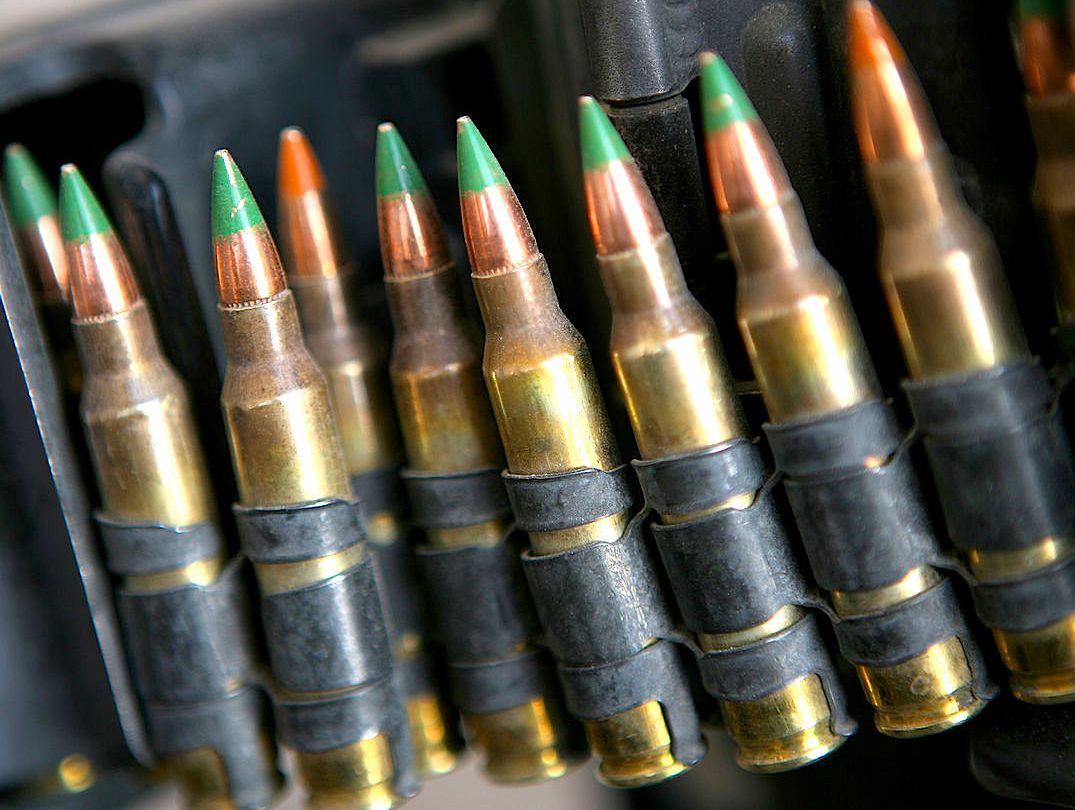They score a goal. I’m on a bar stool, teary.
They score another goal in mere minutes. Disbelief on a bar stool. Teary.
They beat Japan, 5-2. Still on a bar stool, teary.
They get a congratulatory call from President Obama. I’m in front of my computer, teary.
There’s an announcement they will get a parade. I’m on Facebook, teary.
I attend the parade with my friend, Kathi. Behind my big sunglasses, yep, I’m teary.
They get on stage with Taylor Swift. I watch the video, teary.
I open my Sunday New York Times and there’s a full page ad about one of them. Me, outside table at Panera, teary.
Let’s call that my week in review.
Just writing this, I’m thinking, why don’t I just blubber already? Clearly I’m feeling a bit emotional about the United States Women’s National Team winning the FIFA Women’s World Cup and all that’s come with it. And perhaps what’s surprising me the most is how visceral each of these misty reactions is.
Why?
****
In the past year or so when I’ve written about feminism or where we as women stand in our society/culture, I’ve noticed that I’ve become more jaded and even discouraged. I’ve intimated that having beat the drum for so many years as a reporter/columnist, I’ve become weary and now just want to be. On some level, I’ve wanted to hand over the fight to the next generation and be done with it.
Sigh.
And then this … Carli Lloyd, Abby Wambach, Alex Morgan, Hope Solo. All of the rest of them, too.
My tears surprised me because I thought I had become permanently resigned. These athletes jolted me back to at least a place of possibility.
****
Back in the late 1980s I began working for The Trenton Times as a high school beat reporter. Each fall for a decade, I was on soccer fields watching mostly girls (occasionally college women) slug it out on the grass. In the summers I covered a few tournaments and even went to Phoenix with a local travel team that played out there.
I grew to enjoy the sport, but mostly I liked that I was filling the scrapbooks of young females with clips about their high school days. That soon became more, a passion to give them quality coverage and to advocate for them when I became a columnist. I was sometimes strident to the point of obnoxious.
But something was taking hold within me. When a legendary college coach told me one day that she had begun to actively seek my byline, it propelled me forward with even more gusto. When the girls from a high school team called me one day to come to their school to talk to their media class, little did I know it was because they wanted me to champion their cause against the boys in the class who’d told them nobody cares about girls’ sports; I chuckled and dived in.
I was not the only one on our staff giving terrific coverage to female athletes. To the contrary, I was fortunate to be part of a team of reporters and editors that blanketed our coverage area. However, because this was my gender, because I was feminist to my core, I was driven in a different way. Growing up in a traditional Italian-American household, I was ripe for championing a non-traditional female cause. I wanted these girls to be heard because I wanted to be heard.
****
By the time the 1999 Women’s World Cup rolled around, I was no longer covering women’s and girls’ sports. I was a web producer at FoxSports.com in New York. I had made the move to urban living after a Knight-Wallace Journalism Fellowship at the University of Michigan where, incidentally, I was on the receiving end of more than a few snickers for a study plan involving female athletics.
That ’99 U.S. Women’s Team was so special, not just because it won the World Cup, but because it was made up of pioneers who hadn’t set out to be that. They kept playing soccer because they could. In a documentary about them called The 99ers, one of the most memorable parts is when they’re in the bus on the approach to play at the Meadowlands and they realize the traffic they’re seeing is for them.
For. Them.
“The U.S. played its opening [World Cup] match at the Meadowlands in front of 79,000 fans, the largest crowd to ever witness a women’s sporting event in American history,” wrote Travis Waldron of the ’99 team. “The record stood for less than a month, eclipsed by the more than 90,000 that attended the final at the Rose Bowl in Pasadena.”
It was a moment of epic proportions.
And it is that moment I thought of when I stood in a crowd of thousands in Lower Manhattan on Friday awaiting the 2015 champions in a ticker tape parade. Because in my heart of hearts I knew that somebody or many somebodies had to have thought, what if we throw a parade and no one shows up?
My instincts were good. Post-parade, Wayne Coffey of The Daily News wrote:
Tobin Heath, of Basking Ridge, N.J., who scored the fifth and final goal against Japan, wasn’t sure how many people would show up. Then she got on a float and rode by the Wall Street bull and up Broadway, before the red, white and blue-clad masses, and her uncertainty was gone.
“I was in awe,” Heath said.
Me, too.
They had shown up, in droves. Pumped. Ready. So many girls. Yes, they count. Their passion to play is real. Their dreams are real. They matter. Their heroes matter.
Heck, so do mine.
Yes, there are lingering, necessary discussions about what constitutes fair pay. There is a question of whether fans will consistently show up moving forward. We’re not done.
My blubbering will have to wait.

